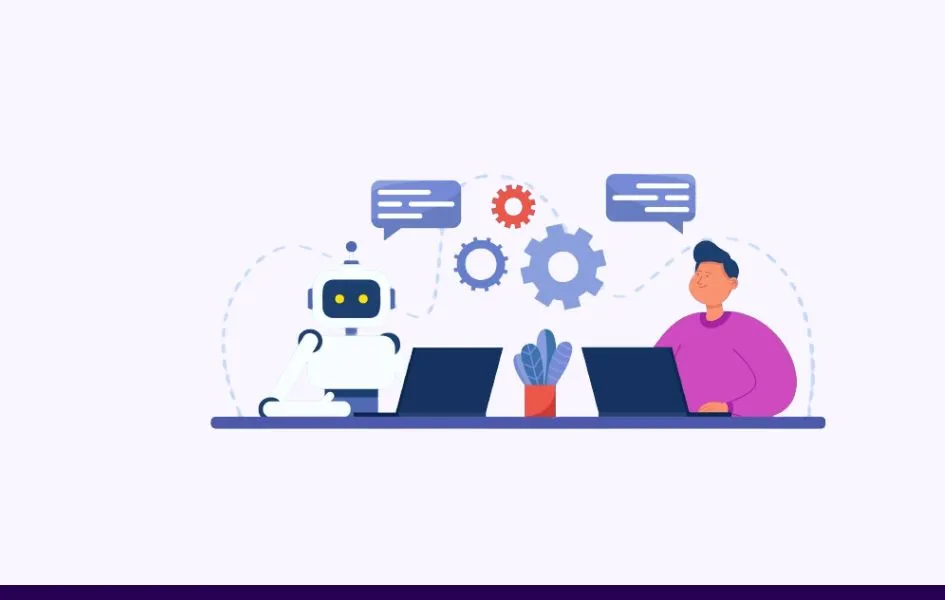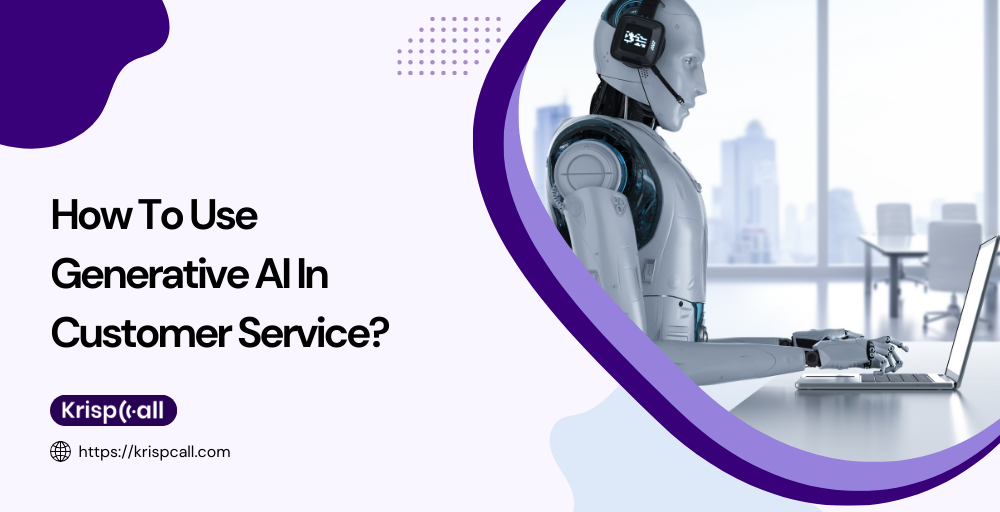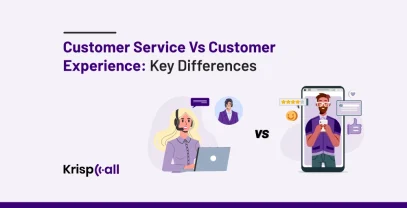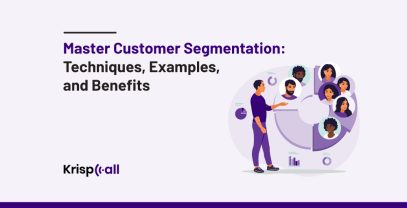In today’s competitive market landscape, excellent customer service is no longer a luxury, it’s a necessity.
Businesses using traditional customer service systems often fail to deliver real-time support and personalized interactions, resulting in long wait times, generic responses, and unhappy customers.
According to Tidio, the AI customer service market size was valued at $308 million in 2022 and is expected to surpass almost $3 billion by 2032.
Fortunately, the presence of Generative AI provides transformative solutions to overcome these issues and revolutionize the customer experience.
In this blog, you’ll learn what Generative AI in customer service is, the advantages and challenges of using Generative AI in customer service, ways to implement GenAI in customer service, its use cases, and the future of Generative AI in customer service.
🚀 30 Sec Summary
- Generative AI in customer service is the use of artificial intelligence technology to provide human-like responses to customer inquiries and interactions.
- Improved response time, 24/7 availability, reduced costs, and personalized interactions are some of the benefits of using GenAI in customer service whereas data security and privacy, accuracy and reliability, and integration with existing systems are some of the challenges of using GenAI in customer service.
- Defining your goals and needs, selecting the right use cases, evaluating your resources, data collection and preparation, integrating existing systems, testing and validation, and implementing and monitoring are some ways to use GenAI in customer service.
- Some of the use cases of Generative AI in customer service are automating repetitive tasks, virtual assistants, personalized recommendations, and feedback analysis.
What is Generative AI in Customer Service?
Generative AI in customer service is the use of artificial intelligence technology to provide human-like responses to customer inquiries and interactions using new and unique content such as texts, videos, images, audio, etc. Unlike traditional AI systems, which frequently rely on predefined rules or algorithms, GenAI uses advanced machine learning algorithms to understand and generate responses based on the context of conversions.

It allows for individualized interactions by evaluating clients’ data and preferences. This lets businesses personalize their solutions to individual needs, improving engagement and building deeper client relationships.
For example, imagine you are trying to purchase a product online and have a query regarding a product. Rather than waiting for a human agent to respond, a chatbot powered by Generative AI immediately provides useful information and recommendations. It’s like having immediate, tailored support, which improves the overall purchasing experience.
Advantages of using Generative AI in customer service
Some of the major advantages of Generative AI in customer service that help boost both efficiency and customer satisfaction are:
- 24/7 availability: GenAI systems are available 24/7 unlike human agents to answer customer inquiries and provide basic support, delivering consistent services regardless of time zones or business hours.
- Improved response time: Generative AI’s powerful algorithms and machine learning capabilities enable organizations to provide instant responses, reducing customers’ wait times. This quick response not only meets the urgent needs of clients but also increases overall satisfaction levels.
- Reduced costs: Generative AI can easily manage a wide range of customer inquiries and duties without requiring human participation. GenAI can handle repetitive jobs like answering common queries, giving basic support, and processing simple transactions helping to free up the human agents to focus on more complicated and value-added activities that require human judgement.
- Personalized customer interactions: Generative AI analyzes clients’ data using complex data algorithms to learn about individuals’ preferences, behaviors, and previous interactions.
With this information, it may create replies that are suited to each customer’s wants and interests. Personalized replies promote a better sense of connection and understanding between businesses and their customers by increasing customer satisfaction.
- Scalability: Businesses with GenAI can rapidly respond to fluctuations in clients’ demands, whether they are in dramatic jumps during peak seasons or continuous growth over time. It helps businesses to handle a large volume of client inquiries and interactions without any delays. This scalability ensures that organizations can meet clients’ needs quickly, regardless of the demands, resulting in increased satisfaction and loyalty.
Although GenAI offers various possibilities and advantages, it also has some challenges to consider:
- Data Security and Privacy: When implementing GenAI systems, data security and privacy remain one of the major considerations as they require access to sensitive client data to personalize replies. Unauthorized access to clients’ data, whether through cyberattacks or internal breaches, increases the risk of privacy violation and identity theft.
- Accuracy and Reliability: While GenAI systems have great capabilities, they risk delivering inaccurate or unreliable responses. Insufficient training data or inherent biases in algorithms can be the main factors. To prevent these hazards, AI algorithms must be carefully tested, validated, and continuously refined.
- Explainability and Transparency: AI systems often lack transparency in how they arrive at their conclusion, making it difficult to debug problems or assure fairness in customer interaction. Businesses that do not have visibility into the decision-making process may struggle to address mistakes or biases in their responses.
To overcome this, organizations must prioritize explainability and transparency to enhance trust and ensure equitable treatment of customers.
- Integration with Existing Systems: Integrating GenAI into existing customer service platforms may be challenging and time-consuming, requiring significant resources and technical knowledge. This process involves testing, customization, and collaboration among multiple teams. Businesses must approach the process strategically, prioritizing collaboration and expertise to achieve seamless integration and maximize the potential of GenAI.
How to use Generative AI in customer service?
To ensure effective implementation of Generative AI in customer service, several key factors must be taken into consideration. Here’s a roadmap for implementing GenAI in customer service that helps you in implementation:
1. Define your goals and needs
Defining your goals and needs involves expressing the specific results you want to achieve and identifying the obstacles or gaps in your present customer service operations that GenAI can fill. By clearly defining your objectives such as improving response time, increasing customer happiness, or lowering operating expenses, you create a roadmap for the implementation process.
Likewise, analyzing your needs involves evaluating your current customer service operations, identifying pain points, and determining where AI-powered solutions may have the greatest impact. This comprehensive review guarantees that the implementation of GenAI is focused and strategic, matching the organization’s objectives and contributing to overall business success.
2. Selecting the right use cases
Selecting the right use cases in GenAI involves finding areas where AI technology may contribute the most value and address existing pain points. Common application includes chatbot for rapid messaging support, virtual assistants for complex interactions, and automated email responses to streamline the handling of customer inquiries.
It is important that you carefully assess your requirements and identify the most appropriate use cases to maximize the benefits of generative AI, improve customer satisfaction, and increase the operational efficiency of your customer service operations.
3. Evaluate your resources
When considering the use of Generative AI in customer service, it is important to thoroughly access your resources. This evaluation involves various factors, including your budgets, existing infrastructures, and data availability.
Firstly, evaluate your financial restrictions to establish the financial feasibility of implementing Generative AI technology taking into consideration both initial and ongoing expenses. Next, assess your existing infrastructure for compatibility with GenAI systems and identify any necessary updates or modifications. Consider the amount and quality of data needed to train and operate the Generative AI model efficiently.
4. Data Collection and Preparation
Data collection and preparation includes collecting a wide range of relevant data sources such as customer interaction logs, historical queries, frequently asked questions (faqs), and any other essential information. However, the data quality is crucial and must be clean, structured, and representative of the types of interactions the AI would have in real-world scenarios.
As a result, the dataset needs to be reduced for extraneous data, noise, and inconsistencies while capturing the intricacies of consumer questions and interactions. Businesses that carefully collect and prepare data can establish a solid foundation for training the GenAI model, resulting in more accurate and dependable responses that meet the needs and expectations of their customers.
5. Integration with existing systems
Integrating AI systems with existing systems requires collaboration with IT teams and software developers to ensure seamless integration and compatibility with existing systems. It involves integrating AI solutions into existing systems like CRM systems, helpdesk software, or communication platforms while minimizing disruptions to current operations.
Moreover, additional customization may be necessary to fit the AI solutions to the organization’s specific goals and requirements. Businesses may ensure that the integration process runs successfully by collaborating with IT teams and software developers.
6. Testing and Validation
It is crucial to thoroughly test the Generative AI system to ensure its effectiveness, dependability, and accuracy in the real world. Running extensive tests to assess the AI’s effectiveness across multiple use cases and scenarios, as well as replicating various customer interactions and inquiries.
User acceptance testing is also important as it involves gathering feedback from both customers and internal stakeholders to identify any problems and areas for improvement. Based on the feedback collected, the required adjustments can be made to fine-tune the GenAI system, ensuring that it meets the organization’s needs and delivers optimal results in enhancing customer service.
7. Implementation and Monitoring
When the system is deemed, it should be deployed in production environments, ensuring seamless integration with the current customer service platform. Following the system’s deployment, it is crucial to monitor its effectiveness continuously, monitoring key metrics such as response times, customer satisfaction, and AI response accuracy.
Continuous monitoring of these data enables organizations to quickly detect any concerns or opportunities for improvement. Businesses can refine their AI systems over time by remaining watchful and active, addressing emerging difficulties, and capitalizing on chances for improvement.
What are the use cases of Generative AI in customer service?
A wide range of applications of Generative AI are available in customer service, which will allow organizations to transform their relationship with their customers. Some of the common use cases of Generative AI in customer service are:
1. Automating Repetitive Tasks (Chatbots)
Chatbots are one of the GenAI systems that respond instantly to customer interactions across messaging platforms. They are capable of resolving ordinary requests, from simple FAQs to more complex issues. They use Generative AI capabilities to give personalized product recommendations based on customer preferences and buy history, improving shopping experiences.

Furthermore, chatbots can help with basic troubleshooting by helping customers through typical difficulties and resolving them swiftly. They ensure that clients receive assistance when they need it, lowering response times and increasing overall satisfaction.
For example, a retail company uses a chatbot on its website to respond to common client concerns. Customers can easily get answers to queries about products, shipping, and refunds without having to wait for human support. The chatbot, responds to queries instantly, lowering response times and increasing customer satisfaction.
2. Personalized Recommendations
Generative AI algorithms can provide individualized product suggestions by examining a large volume of client data, including individual tastes, purchase history, and browsing behavior. These recommendations are particularly relevant to each customer raising conversion rates and improving overall shopping experiences.
Businesses that use GenAI technology can profit from cross-selling and upselling opportunities by offering complementary items or upgrades that are relevant to their client’s interests and needs. As a result, personalized recommendations not only increase income but also promote greater consumer involvement and loyalty.
For example, an online streaming service uses GenAiI to analyze users’ viewing history and interests. Based on this information, the platform creates personalized suggestions for each user, improving their viewing experience and engagement.
3. Virtual Assistants
Virtual assistants are capable of handling complicated transactions and engaging in natural language discussions with customers. They perform a wide range of tasks including appointment scheduling, personalized recommendations, and in-depth advice on various topics.

Using GenAI technology these virtual assistants can interpret and rely on client requests in a human-like manner improving the entire customer experience. Their versatility and ability to handle complex tasks eliminate the need for human involvement, allowing organizations to streamline processes and allocate resources more efficiently.
For example, a financial institution uses a virtual assistant on its website to help customers with account inquiries and transactions. Customers can ask virtual assistant questions about their account balance, recent transactions, and money transfers across accounts. The virtual assistant, responds and guides customers in real-time, making it easy and efficient for them to handle their accounts online.
4. Feedback Analysis
Generative AI algorithms may extract meaningful insights from a variety of sources including surveys, reviews, and social media comments, allowing for more informed decision-making. These insights help businesses discover emerging trends, spot potential problems, and assess overall customer happiness.
Also, feedback analysis enables organizations to proactively address customer complaints, manage risks, and capitalize on opportunities for growth and innovation. Overall, GenAI-driven feedback analysis enables businesses to better understand and address their customers’ changing needs, enabling continuous improvement.
For example, a retail company uses GenAI to evaluate customer feedback from online reviews and surveys. The corporation notices that customers are complaining about long wait times at checkout. Based on this information, the Company implements initiatives to shorten the checkout process, leading to customer happiness and engagement.
What is the future of Generative AI in customer service?
The future of Generative AI in customer service is set to transform the landscape of customer interactions. As AI technology advances, Generative AI systems will improve their ability to interpret and respond to client requests with exceptional accuracy and efficiency. Utilizing powerful natural language processing and machine learning algorithms, GenAI will help businesses enhance customer satisfaction and brand loyalty.
Moreover, GenAI will be able to optimize customer service even further by integrating other cutting-edge technologies, like sentiment analysis and predictive analysis. AI-powered systems will analyze massive volumes of consumer data to identify useful insights, predict future trends, and respond proactively to client requirements.
Wrapping Up!
Generative AI transforms your customer service from reactive to proactive and personalized. It helps to streamline operations by automating repetitive tasks and providing agents with real-time suggestions. Also, its ability to analyze data and personalize responses develops stronger consumer connections.
Be sure to carefully assess your needs and resources prior to selecting an AI solution that works well with your existing systems. Most importantly, prioritize the human touch. Rather than replacing your agents, generative AI should complement them.
FAQs
How does generative AI differ from traditional customer service?
Generative AI differs from traditional customer service by generating unique, context-aware responses rather than depending on fixed scripts, resulting in more personalized and dynamic interactions for clients.
How scalable is generative AI for businesses of different sizes?
Generative AI provides scalability that is adaptable to businesses of all sizes, allowing for efficient customer interaction operations regardless of scale.
Can Generative AI be integrated with the existing customer service platforms?
Yes, Generative AI can be integrated with the existing customer service platforms.





